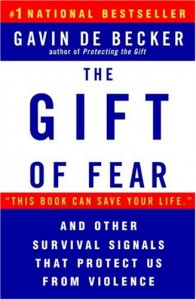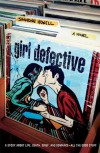Currently reading
Soulless: The Manga Vol. 2 (The Parasol Protectorate Manga #2)
Asymmetry (Twelve Planets)
Mullumbimby Madness #1: Never Trust a Book with a Colour Cover
The Walking Dead, Vol. 18: What Comes After
Sunburnt Country
Bark at the Moon: Bert Rokey's Letters from the South Pacific, 1942-1945: How a Soldier and Sabetha, His Kansas Farm Community, Survived World War II
The Adventures of Tom Sawyer
Girl Defective
Midnight Blue-Light Special
My Policeman
The Gift of Fear and Other Survival Signals that Protect Us From Violence
 If you're my Goodreads 'friend' you probably already know a fair bit about this book, so I won't recap it, except to point here for those who don't know: this is a few quotes from his Pre-Incident Indicators part of the book, which is the core of the book for me. De Becker describes clearly the ways in which abusers will weasel, charm, promise, and loan-shark their way into positions where they can exert power, dominance, and violence over women. Physical and emotional abusers alike (and those on the spectrum) use these tactics, and they all sound so very familiar, and resonate so deeply. It was coincidence that I started reading this just before the latest blogosphere blowup over serial abuser Hugo Schwyzer, who I've always found horribly, skin-crawlingly creepy. Reading this book helped codify that, and other more personal experiences from my past. What I like about the book is that De Becker doesn't position himself as an expert who knows so much more than his readers about violence and abuse and pre-incident indicators. The goal of the book is to describe to the reader the ways in which they already know how to predict violence, and that although these ways are often called "intuition", they are based on facts and realities and are to be trusted and respected. In other words? Women aren't 'crazy' or lying or manipulative when we find certain people creepy and want to stay away from them. And it's not ok to instruct us to shut up, to trust, to forgive, to absolve; and that it's not ok to characterise our rational protective behaviours as 'grudges' or 'man-hating' or 'hysteria'.The one star is lost because of what I felt to be some victim-blaming sections. If it was a general overview about violence prevention, I'd have a huge problem with it. However it's working already within a framework of self-denfence, of how we as individuals and potential prey intuit and predict violent behaviour, so I am a little less suspicious of the framing within that context. For example: teaching self-defence classes isn't victim-blaming; proposing self-defence classes as The Solution to sexual violence would be. I feel that some of the discussions in the book perhaps could be left in but rewritten to get rid of that victim-blaming feeling.
If you're my Goodreads 'friend' you probably already know a fair bit about this book, so I won't recap it, except to point here for those who don't know: this is a few quotes from his Pre-Incident Indicators part of the book, which is the core of the book for me. De Becker describes clearly the ways in which abusers will weasel, charm, promise, and loan-shark their way into positions where they can exert power, dominance, and violence over women. Physical and emotional abusers alike (and those on the spectrum) use these tactics, and they all sound so very familiar, and resonate so deeply. It was coincidence that I started reading this just before the latest blogosphere blowup over serial abuser Hugo Schwyzer, who I've always found horribly, skin-crawlingly creepy. Reading this book helped codify that, and other more personal experiences from my past. What I like about the book is that De Becker doesn't position himself as an expert who knows so much more than his readers about violence and abuse and pre-incident indicators. The goal of the book is to describe to the reader the ways in which they already know how to predict violence, and that although these ways are often called "intuition", they are based on facts and realities and are to be trusted and respected. In other words? Women aren't 'crazy' or lying or manipulative when we find certain people creepy and want to stay away from them. And it's not ok to instruct us to shut up, to trust, to forgive, to absolve; and that it's not ok to characterise our rational protective behaviours as 'grudges' or 'man-hating' or 'hysteria'.The one star is lost because of what I felt to be some victim-blaming sections. If it was a general overview about violence prevention, I'd have a huge problem with it. However it's working already within a framework of self-denfence, of how we as individuals and potential prey intuit and predict violent behaviour, so I am a little less suspicious of the framing within that context. For example: teaching self-defence classes isn't victim-blaming; proposing self-defence classes as The Solution to sexual violence would be. I feel that some of the discussions in the book perhaps could be left in but rewritten to get rid of that victim-blaming feeling.













